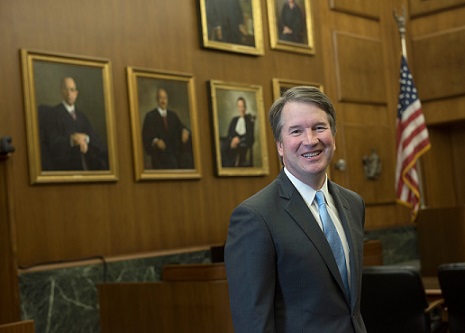This week, the Senate Judiciary Committee will begin Supreme Court nominee Brett Kavanaugh’s confirmation hearings. To recap, at 9:00 p.m. on July 9, President Donald Trump nominated Judge Brett Kavanaugh of the U.S. Court of Appeals for the District of Columbia Circuit to fill the vacancy on the Supreme Court left by the retirement of Justice Anthony Kennedy.
Born in Washington, D.C., in 1965, Brett Kavanaugh began his legal career after graduating from Yale Law School in 1990. Following his work assisting special counsel Kenneth Starr’s investigations into Bill Clinton’s professional and personal dealings, he joined the George W. Bush White House as counsel and staff secretary. Since 2006, Kavanaugh has served as a judge on the U.S. Court of Appeals for the District of Columbia Circuit. Additionally, he previously clerked for Justice Kennedy; and some have speculated that Kavanaugh’s position on President Trump’s shortlist of replacements made Kennedy more inclined to retire at this time.
Following the heartbreaking death of Senator John McCain (R-Ariz.), Republicans now hold a narrow 50-49 majority in the Senate. Senator McCain previously won a sixth term in 2016 that goes until 2022. Under Arizona law, Arizona’s governor Doug Ducey (who is up for reelection this fall) is required to pick a Republican to serve the remainder of the Senator’s term. Ducey respectfully chose to withhold the name of his nominee until after Senator McCain was buried this past weekend, and the announcement is expected at any minute.
However, even a conservative nominee does not guarantee an easy path forward for Kavanaugh. Previously, Kavanaugh’s nomination to the D.C. Circuit stalled for three years before he was finally confirmed in 2006. When the vote did eventually occur, only four Democrats supported his nomination. Senator Tom Carper (D-Del.) is the only one of those four still serving in the Senate today, but he has already indicated that he plans to oppose Kavanaugh’s confirmation at this time.
Three Democrats did vote in favor of Trump nominee Neil Gorsuch during his confirmation vote last year: Joe Donnelly of Indiana, Heidi Heitkamp of North Dakota and Joe Manchin of West Virginia. Notably, all three of these Senators are up for reelection this November in states that President Trump won easily in 2016; and all three have put out statements showing some openness for the nominee.
Should he be confirmed, Brett Kavanaugh will have an opportunity to shape legal matters for decades to come. As it relates to immigration policy, Kavanaugh is a superb choice. In separate immigration-related dissents, Judge Kavanaugh rejected illegal alien voting in union elections and also noted that “mere economic expediency does not authorize an employer to displace American workers for foreign workers.” Those dissenting opinions are noteworthy because they demonstrate that Kavanaugh believes the function of American immigration law is to protect and prioritize the needs of American workers.
As FAIR President Dan Stein said, “With important immigration-related decisions heading to the Supreme Court – including the challenge to the Obama-era Deferred Action for Childhood Arrivals (DACA) – Judge Kavanaugh will provide expert insight into the legality of the program and the ability of future administrations to circumvent Congress and create tailored amnesty programs for large groups of illegal aliens.”
Please stay tuned to FAIR as we monitor the confirmation process.





3 Comments
Pingback: Brett Kavanaugh’s Record on Immigration Raises Questions : Immigration Impact
Most people do not realize the power of judges. And when they misuse that power to legislate from the bench, as so many liberal judges tend to do, their decisions have the weight of law unless reversed. They find “rights” for illegals that are not remotely inferred in the Constitution.
One thing they can affect is voter security. The Democrats go on and on about “the Russians interfering in our elections”. It has been repeatedly shown that not one vote was changed by any attempt to hack into voting machines. But there seems to be no problem with just accepting someone’s word that they are a citizen, instead of having a secure ID which anyone is able to obtain. Every state has programs to help even the poorest citizen for free.
How did Obama circumvent Congress on DACA and why can’t Trump undo it?